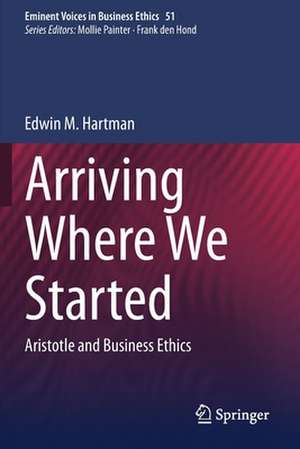Arriving Where We Started: Aristotle and Business Ethics: Issues in Business Ethics, cartea 51
Autor Edwin M. Hartmanen Limba Engleză Paperback – 23 oct 2021
| Toate formatele și edițiile | Preț | Express |
|---|---|---|
| Paperback (1) | 385.84 lei 43-57 zile | |
| Springer International Publishing – 23 oct 2021 | 385.84 lei 43-57 zile | |
| Hardback (1) | 393.13 lei 43-57 zile | |
| Springer International Publishing – 23 oct 2020 | 393.13 lei 43-57 zile |
Din seria Issues in Business Ethics
- 17%
 Preț: 364.75 lei
Preț: 364.75 lei -
 Preț: 420.97 lei
Preț: 420.97 lei - 15%
 Preț: 527.48 lei
Preț: 527.48 lei - 15%
 Preț: 644.63 lei
Preț: 644.63 lei - 15%
 Preț: 730.86 lei
Preț: 730.86 lei - 20%
 Preț: 517.11 lei
Preț: 517.11 lei - 15%
 Preț: 598.50 lei
Preț: 598.50 lei - 15%
 Preț: 645.60 lei
Preț: 645.60 lei - 18%
 Preț: 1220.88 lei
Preț: 1220.88 lei - 18%
 Preț: 953.03 lei
Preț: 953.03 lei - 15%
 Preț: 643.99 lei
Preț: 643.99 lei - 15%
 Preț: 644.82 lei
Preț: 644.82 lei - 15%
 Preț: 639.73 lei
Preț: 639.73 lei - 15%
 Preț: 635.96 lei
Preț: 635.96 lei - 20%
 Preț: 558.33 lei
Preț: 558.33 lei - 15%
 Preț: 640.55 lei
Preț: 640.55 lei - 15%
 Preț: 644.49 lei
Preț: 644.49 lei - 18%
 Preț: 772.93 lei
Preț: 772.93 lei - 15%
 Preț: 637.59 lei
Preț: 637.59 lei - 15%
 Preț: 643.99 lei
Preț: 643.99 lei - 15%
 Preț: 644.82 lei
Preț: 644.82 lei - 15%
 Preț: 700.61 lei
Preț: 700.61 lei - 5%
 Preț: 1098.27 lei
Preț: 1098.27 lei - 15%
 Preț: 646.43 lei
Preț: 646.43 lei - 15%
 Preț: 643.99 lei
Preț: 643.99 lei - 18%
 Preț: 952.89 lei
Preț: 952.89 lei - 15%
 Preț: 641.38 lei
Preț: 641.38 lei
Preț: 385.84 lei
Nou
Puncte Express: 579
Preț estimativ în valută:
73.85€ • 80.25$ • 62.08£
73.85€ • 80.25$ • 62.08£
Carte tipărită la comandă
Livrare economică 21 aprilie-05 mai
Preluare comenzi: 021 569.72.76
Specificații
ISBN-13: 9783030440916
ISBN-10: 3030440915
Pagini: 233
Ilustrații: XIX, 233 p. 1 illus.
Dimensiuni: 155 x 235 mm
Greutate: 0.36 kg
Ediția:1st ed. 2020
Editura: Springer International Publishing
Colecția Springer
Seriile Issues in Business Ethics, Eminent Voices in Business Ethics
Locul publicării:Cham, Switzerland
ISBN-10: 3030440915
Pagini: 233
Ilustrații: XIX, 233 p. 1 illus.
Dimensiuni: 155 x 235 mm
Greutate: 0.36 kg
Ediția:1st ed. 2020
Editura: Springer International Publishing
Colecția Springer
Seriile Issues in Business Ethics, Eminent Voices in Business Ethics
Locul publicării:Cham, Switzerland
Cuprins
Introduction.- Chapter 1. Making Sense of the World: Substances.- Chapter 2. Moral Imagination.- Chapter 3. Intention, Rationality, and Irrationality.- Chapter 4. Free Will.- Chapter 5. Community and Commons.- Chapter 6: The Status of Business Ethics.- Chapter 7: Ethics Across Boundaries.
Recenzii
Notă biografică
Edwin Hartman has undergraduate degrees from Haverford College and Oxford University, a Ph.D. from Princeton University, and an MBA from the Wharton School. He has taught philosophy, management, and business ethics at the University Pennsylvania, Rutgers University, and New York University. He was a consultant in strategic management with Hay Associates. He has authored many articles and four books: Substance, Body, and Soul: Aristotelian Investigations (Princeton, 1977), Conceptual Foundations of Organization Theory (HarperCollins, 1988), Organizational Ethics and the Good Life (Oxford, 1995), and Virtue in Business: Conversations with Aristotle (Cambridge,2012). In 2014 the Society for Business Ethics gave him its Lifetime Achievement Award for scholarship in business ethics.
Textul de pe ultima copertă
Edwin Hartman offers an account of his intellectual journey from Aristotle to organization theory to business ethics to an Aristotelian approach to business ethics. Aristotle’s work in metaphysics and psychology offers some insights into the explanation of behavior. Central to this sort of explanation is characteristically human rationality. Central to successful organizations is characteristically human sociability. That human beings are by nature rational and sociable is the basis of Aristotle’s ethics. Though a modern organization is not a polis in Aristotle’s sense, it has good reason to treat people as rational and sociable on the whole, and thereby to preserve the organization as a commons of people linked by something much like Aristotle’s account of strong friendship. Organizations that are successful in this respect, particularly those that deal with a nationally diverse workforce, may offer a far-reaching and attractive model.
Caracteristici
Chronicles Hartman’s intellectual development from Aristotle to organization theory to business ethics Presents the author’s development of thought as a coherent process Proves that much of Aristotle’s work can be applied to modern-day business ethics
